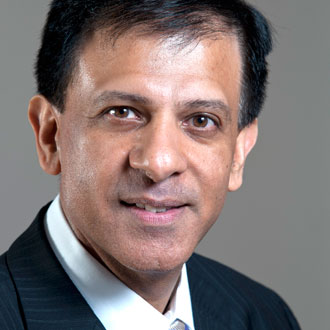The GPC is aiming to negotiate further reductions in the size of QOF from next April, chair Dr Chaand Nagpaul has revealed during an interview at Pulse Live.
Dr Chaand Nagpaul said that he was keen to reduce the burden on GPs and that part of that would be making QOF much smaller.
His comments come after health secretary Jeremy Hunt said the reduction of QOF targets in this year’s GP contract did not go far enough, telling a conference that he would ‘remove the lot of them if he could’.
Dr Nagpaul was speaking during an interview at the Pulse Live meeting in Manchester about his first year as chair, and his plans for the next GP contract.
He said that his main achievement had been was bringing the Government back onto the policy-maker negotiating table – following the 2013/14 GP contract imposition – and achieveing a 40% reduction in QOF.
He also said: ‘One of the most important things for me was to actually get back onto the negotiating table and I think in that regard, if you actually reflect, probably about 80 or 90% of the imposition, which months earlier we were told was non-negotiable, actually has now been scrapped… I don’t think we have got as far as we would like to, but I think it is a start to actually have negotiated a reversal on policy.’
Asked whether QOF will shrink even further next year, Dr Nagpaul said: ‘That is precisely what we would like to do. We would like to make sure that QOF complements good clinical care, doesn’t add clinical burden.’
He added: ‘What has happened is that QOF became a monster and we have now actually scaled that back and we would like to do more of that. I think it is right to have clinical standards, but clinical standards that are actually relevant, not just add bureaucracy.’
He said that while GP workload was still growing, a lot of that was not because of the GP contract, but because of other factors.
He added: ‘I think it is very hard to look at the contract in isolation. GPs are suffering workload from all quarters, and much of it doesn’t relate to the contract. For example the swathes of work that is moving out of hospitals into GP consulting rooms in an unresourced manner, the increased demands on our time from an ageing population – these sort of things are not related to the contract.’
Dr Nagpaul did not rule out a proposal from one new BMA Council member orchestrating a mass resignation from the profession over pay, but said the profession currently did not support it.
He said: ‘It is not so much about my opinion, it is about what the profession wants. The last thing that any of us needs is to put up an idea that isn’t going to be supported by the profession. To have any impact you would need to have some confidence that the profession at large would actually follow suit. We had an event recently, the LMCs met, and there certainly wasn’t any mood for undated resignations. If that is what I am being told by the mass of GPs, then obviously as a leader of profession I will respond to that.’

















